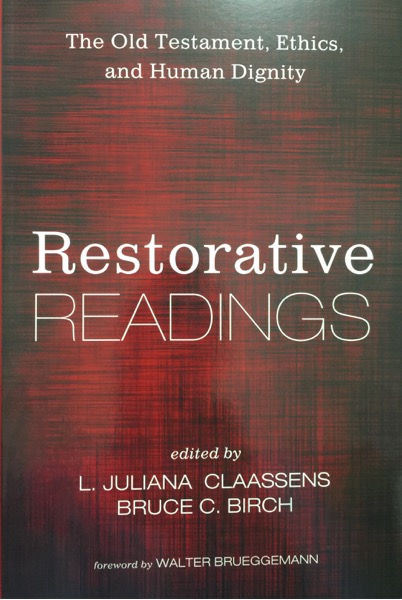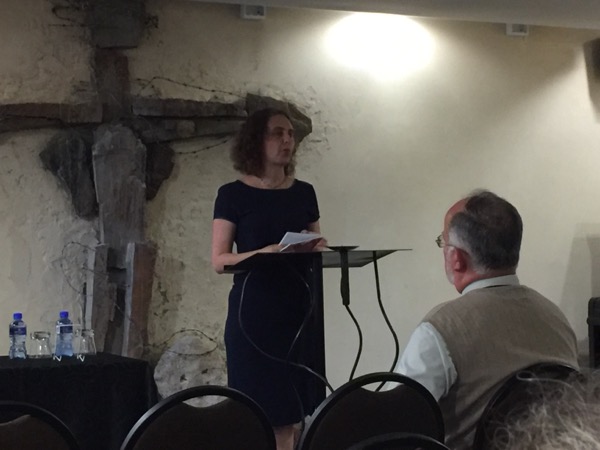Starting my first academic sabbatical at Oxford University
 Friday, August 10, 2018 at 10:09AM
Friday, August 10, 2018 at 10:09AM 
 Friday, August 10, 2018 at 10:09AM
Friday, August 10, 2018 at 10:09AM 
 Monday, October 26, 2015 at 8:38PM
Monday, October 26, 2015 at 8:38PM 

This evening we launched the book of my colleague and friend Prof L Juliana Claassens, "Restorative Readings: The Old Testament, Ethics and Human Dignity" which she co-edited with Prof Bruce Birch.
Among the contributors are a foreword by Walter Brueggemann, and chapters by Charlene Van Der Walt, Esias Meyer, Gerald West, Ntozake Cezula, Douglas Lawrie, Jacqueline Lapsley, and Cheryl Anderson.
I was privileged to write a little piece on the Bible and Ethics as hospitable conversation at the end.
Julie very kindly included me in this project and has opened many doors for me since then.
I am so grateful to her and can highly recommend this important text for anyone who wishes to read about the Old Testament and engage issues of human dignity and ethics.
Read more about the book here: http://www.amazon.com/Restorative-Readings-Testament-Ethics-Dignity/dp/1625647212
 Tuesday, June 3, 2014 at 5:08PM
Tuesday, June 3, 2014 at 5:08PM There is a well known saying among academics the world over, Publish or Perish.
It is true! In the academic world the publication of research is critical to one's career - I like to see it in a less 'survival' directed framework. Namely, that I want to publish my research because I believe it serves the world and helps the Church and Christians in their task of making the world more just, beautiful and blessed. Perhaps I am being a little idealistic?
Regardless, I try to publish a book over other year or so, and I also try to get about three scholarly articles in peer reviewed journals each year. When you consider the work that it takes to do that while still teaching undergraduate and postgraduate classes, as well as supervising multiple Masters and PhD students, you can imagine that I need a pretty efficient system to keep a record of what I am reading, and easily get that information into my books and academic articles.
For some years I have been using Zotero as a citation manager. It is a great tool since it is open source, it works really well on the Mac and PC, and it stores your reference database (books, articles, documents, web pages, videos, interviews etc.) in the 'cloud'. It also has plug ins for Microsoft Word (on the PC and the Mac), and also for open source word processing software. It is really easy to use!
However, I have been frustrated by two things. First, it does not have an iOS client for use on my iPhone and iPad. I often only travel with my iPad and when I have a few spare moments it would be great to be able to catch up on the latest journal articles and books and add them to my citation index for later use. Alas, that cannot be done. I have to wait until I am back at my Mac, fire up my web browser, either find the article or book on Google Scholar, Amazon, or Google books, and then add the source automatically. Or worse still, if it is an older or lesser known source I have to add it manually.
My second frustration is that Zotero is not supported by the University of Stellenbosch Library system (I am a faculty member at Stellenbosch University). This means I often search for titles in the library, and once I have found them there I have to search for them a second time (on Amazon, Google Books, Google Scholar, Gale etc.) to be add the reference to my library.
One of our library staff suggested I try Mendeley. It is also a free piece of citation management software. It also works on the Mac and PC (and Linux), and as a bonus it also has an iOS client! So that is great. However, it is not opensource - that always worries me a little. Often it means that if there is a problem, or the owners no longer make money from the software or loose interest in it your data could get 'stuck' in an outdated piece of software. Opensource solutions tend to updated more quickly and over a longer period of time since it is the users who drive that process.
Still, it is worth checking out since it is tied into our University library system (a huge bonus that will cut at least one significant step out of my Zotero workflow). Moreover, the University has some sort of agreement with Mendeley that allows faculty to have more space for storing references on online copies of PDF's and articles (Zotero charges for extra space). It also works well with the Mac and has a lovely interface, and as I mentioned above it also has an iOS client.
Here is a little video from Portland State University that does a good job of comparing Zotero and Mendeley
Do you use citation management software? I know many folks find the learning curve too steep and have stuck to manually entering every citation! My goodness, I simply don't have time or patience (or enough of an eye for detail) to do that well.
If you do use citation software what do you use and why? If you use either Zotero or Mendeley I would love to hear your reasons for choosing one over the other, and any tips you may have to help me maximise my use of the software.
 Prof Dion Forster
Prof Dion Forster
Thanks to everyone who posted comments on facebook, twitter and here. I got such useful information. It would seem that the majority of people who responded liked Zotero much more.
I also discovered that our University DOES actually support Zotero directly in the Library search results! Amazing! The University actually pointed me to this video on Zotero that shows you how to get data into Zotero.
Getting Stuff Into Zotero from zotero on Vimeo.
Here is the article from the University of Stellenbosch Website:
In a PREVIOUS POST we introduced you to Zotero, a powerful referencing tool. This time around, we’ll show you how it works.
COLLECTING RESOURCES
There’s A COOL SCREENCAST showing all of the below, as well as A GREAT GUIDE.
Zotero’s first ‘killer’ feature is the fact that it makes it much quicker and easier to accurately collectinformation about your sources. In most cases, you can grab all of the information required for a citation (e.g. title, date, publisher and place, in the case of a book) in a single click, while you are viewing the specific item on your preferred research/library website (e.g. Google Scholar, JSTOR, EBSCOHost). There are four ways to collect sources:
CITING YOUR SOURCES AND GENERATING A BIBLIOGRAPHY
Once you’ve collected all of your sources in your Zotero library, you can start citing them in Microsoft Word (and OTHER WORD PROCESSOR) documents. This is Zotero’s second ‘killer’ feature: that it does all of the style formatting dirty work behind the screens. You simply position your cursor where you want to add a citation, go to the “Add-ins” tab in Word and click the “Insert Citation” icon. This will bring up an inviting, red-bordered textbox, in which you can type the title/author of your source(s). Pressing ENTER will add a neat citation in your preferred style. On that note: there are MORE THAN 6000 STYLES available for download from the Zotero website.
Many students will know the sinking feeling of having finished the actual writing of their paper/report/thesis, only to remember that the bibliography is still conspicuously absent. Here, Zotero’sthird ‘killer’ feature kicks in: it keeps track of what you’ve cited in your document and generates a complete bibliography, in your selected style, at the click of a button.
Check out THIS PAGE for a full guide to citing and generating a bibliography with Zotero.
Next time – Advanced tips to get the most out of Zotero.
[ARTICLE BY JOHANNES JONKER]
 Tuesday, October 23, 2007 at 8:08PM
Tuesday, October 23, 2007 at 8:08PM  I found this article quite useful. It's for all us 'wannabe' writers!
I found this article quite useful. It's for all us 'wannabe' writers!
Computers and the Internet are revolutionizing the way we create and share information. Through blogs, wikis and social networks, you can reach literally 1.2 billion of people without leaving your room.
That being said, a little attention toward correct spelling and basic grammar rules couldn’t hurt, right? Below you will find some curious, to say the least, errors that we gathered on the Web.
"You are the best mom in the hole world" - Maybe the person lives in a hole or something, but he probably wanted to say the whole world.
"The kid's were very attentive because of the recent tsunami" - The apostrophe has a wide range of uses within the English language, but forming plurals is not one of them. The kids were very attentive.
"you might as well ask if less men enter nursing because there are less men in nursing" - Less men? Fewer men you mean! Less is used for uncountable things, like less sugar or less money. For plural things (countable), you must use fewer, like fewer cars.
"The stock market made further progress forward yesterday" - This one is coming from the New York Times (ouch!). Progress means to move forward or to develop, so “progress forward” is a redundancy, and should be avoided. It’s like to say that something is “absolutely essential…”
"took me around 1 hour and my cell ran out of credit) to resolve some minor (yet presistant) issues" - The issues were persistent, not presistant.
"The company provides solutions in the following specialty areas: information technology, proffesional services and direct hire/search" - This was found on a LinkedIn resume (ouch again!). Not sure how professional the services really are.
"the importance of the Internet and the roll it plays in our everyday lives" - The Internet plays a very important role, not roll, in our lives.
"These could of been handy because it’s easier to look at a more simple, less ‘messy’ theme to understand how…" - These could have been, not could of. Also, if something is “more simple” it is simpler.
"1K should be sufficient for an ernest payment" - Ernest is a male name. The good-faith deposit used in real estate transactions is called earnest payment.
"make sure that each of these templates contain the same XHTML/HTML" - Each refers to singular subjects, and the verb must agree with the subject. Each of these templates contains.
"The nature of his illness had been kept quite and not many of the crew and cast had seen much of him in the intervening time" - The nature of his illness had been kept quiet (not "quite").
"A friend will do whatever they can to lift you up when your down because they don’t like to see there friend hurt" - Friends (not "A friend") will do what ever they can. The pronoun must agree with its antecedent. When you’re (not your) down. To see their (not there) friend.
"he’s alot like a younger version robert horry, same height, long body" - This is a mistake that happens a lot (not alot) around the Internet.